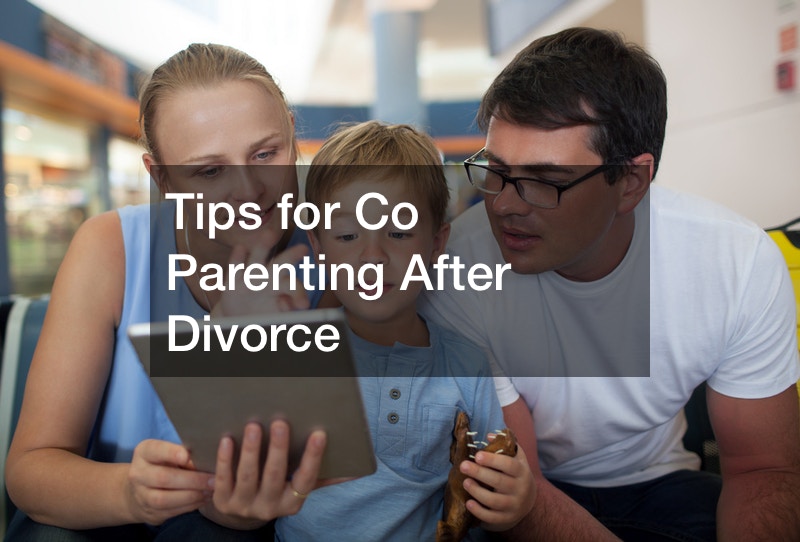
There are plenty of concerns that arise after you’ve finalized your divorce. With your children taking priority, anything, from pediatric dentistry to pediatric foot treatment, might be too stressful to handle. That is unless you stay on top of the relationship with your ex-spouse. But after what may have seemed like a happy start, your marriage got off in the wrong direction, and a divorce was the inevitable conclusion. Most couples will probably know from the start that a divorce can be filled with anger and resentment, plus plenty of negativity and room for bad decision-making. If you or your ex-spouse want to focus on the well-being of your children, that’s great. This article will teach you some tips for co parenting after divorce. That way, going forward, the environment amid a broken family can still be geared toward problem solving and solutions.
Why Is Divorce So Hard for Ex-Spouses?
Many betrayals exist during and after a marriage that make divorce almost unbearable to deal with. Not only is divorce expensive, messy, time-consuming, and confusing, but your children can sometimes get caught in the middle if you’re not careful how you act. Divorce is difficult because the proper communication mechanisms that were once in place are now broken and filled with tension. When ex-spouses can’t communicate, priorities get out of order and tensions rise, ultimately increasing the potential for aggression and disagreements over time. If you want to put the kids first and take care of the family for the long term, there are a few tips for co parenting after divorce that you should discuss with your ex-spouse.
Embrace Time to Heal From Divorce
The truth is, you need time to heal from divorce since the marriage was likely filled with broken promises and lies. No one is perfect, and it’s important for both you and your ex-spouse to understand this from the moment you start settling the divorce. Both of you need separation and time to process what went wrong and how you’re going to move forward. Without that time, ex-spouses should expect conflict as they struggle to process their emotions and deal with a difficult situation at once. While you don’t have to stay apart forever, giving yourself a few weeks or even a month or so will help you determine what approach you should take. Remember, managing the relationship from here on out will require strength, courage, dedication, and patience. In many cases, it’s the ex-spouse who’s willing to forgive and let go that’s most mature in the relationship. Either way, the time you take to heal should be one of your top priorities when considering tips for co parenting after divorce.

Don’t be Overly Negative
Negative behavior consists of complaining, blaming, lying, or taking a pessimistic view of every issue at hand. When ex-spouses are negative around each other, tempers are more likely to flare. The negativity that exists in the relationship eventually turns into pointing fingers and false perceptions. Both parties aren’t going to always be on the same page. So, when one ex-spouse brings the other down, it’s both parents that are now ill-equipped to focus their interests on the needs of the family. More importantly, a toxic environment in the household means no one is thinking about optimism and solutions. And children can’t help but notice when they see the mood is always dark and the conversation is consistently filled with anger. Negativity rubs off on children because they’re looking to parents to be role models for the rest of their lives.
If you can’t adopt a positive mindset, start thinking of the way a problem looks and whether or not there is a solution. Often, the key to overcoming negativity is simply being willing to look at problems as opportunities, and not as dead-ends. For example, dental care for kids might seem like a topic worth addressing right away. But why be negative about some of the most pertinent issues in life?
Don’t be Bossy or Condescending
Telling your ex-spouse what to do will create hostility and tension. For one, adults don’t like being told what to do unless it’s their supervisor or parents instructing them. Then, there is the potential that tips for co parenting after divorce might not be acceptable for one ex-spouse the way they are for the other. Just think of how you would want to be talked to when you’re communicating with your ex-spouse after a divorce. If you don’t want to be talked down to, then there’s a good chance you might have thought about the impact that being talked to like that has on a person. There are a lot of ex-spouses who feel like they’re being minimized, bossed around, or given orders as if they’re less valuable. But those who stand up for themselves and explain how they’re feeling are more likely to stop their ex-spouse’s condescending behavior.

Learn to Talk About Problems
From financial issues to custodial rights, there are plenty of problems for ex-spouses to talk about. Interestingly, the sheer number of conflicts worth discussing might also motivate one ex-spouse to remain silent and keep the nature of a conflict hidden. While there is plenty of room for disagreement, it’s a good idea to develop the idea of hashing out problems as soon as they happen. Ideally, away from the kids so that what you’re talking about doesn’t get misunderstood later. The point to remember is that people who bottle up their problems have a hard time understanding them later. When there’s a disagreement between ex-spouses, often, the tendency is for one ex-spouse to blame the other and not take responsibility for anything. Instead of taking this option, consider taking the initiative to prepare a once-a-week routine. Everyone puts what needs to be discussed on the table. That includes discussion surrounding food allergies, physical therapy services, and the next appointment with the eye doctor. The sooner you work out conflict, the better you both will be.
Always Put the Family First
Putting the family first means not letting mundane issues interfere with your ability to best care for your child. Rosacea therapy might be a mundane issue on a day when the child is sick. But the best pediatrician would always tell you that no matter what the health concern, the family should always remain a priority. Any friend or family member would tell you the same thing for a good reason. Often, broken relationships present signs that one party doesn’t prioritize compassion and sincerity. But these qualities are needed to maintain a healthy relationship even after divorce. If you find that every trivial issue seems too important to let go of, remind yourself of how much harder life would be if your children began to see you as the enemy. Rather than resist the urge to communicate, abandon the idea of holding grudges forever. Today should be a new day where tips for co parenting after divorce put you in the best position to see and think clearly. Stop and ask yourself what’s ahead of you after a divorce. If what you want is peace and comfort, then you’ll have to compromise on bad days and find a way to work together, no matter what. Better to put the family first than a problem, because it’s the family that will always be there for you, even when the problems are too much to handle.

Be Kind and Don’t Vent
Here is one of the best tips for co parenting after divorce. There comes a time when you don’t have the capacity to keep your anger and anguish confined to yourself. Whenever you see your ex-spouse, you might feel the need to unload on them right away. But ranting and raving about what the ex-spouse did wrong is not going to make divorce easier. While one ex-spouse will be dealing with the aftermath of getting screamed at, the other will be on sort of a power trip as they get off on breaking their ex-spouse down. Unfortunately, this kind of yelling and screaming causes further division and deeper separation between two ex-spouses. Not only that, venting doesn’t actually put anyone in a position to solve a conflict. Talking strategically, on the other hand, will present opportunities for ex-spouses to heal. If the end of your divorce has brought you misery, now is not the time to push all of your problems on your ex-spouse all at once. Even if you apologize afterward, the pain from being belittled and yelled at can cause an ex-spouse to feel unhealthy mentally. The better alternative is to look for opportunities to show calmness and strength, communicating with your ex-spouse with dignity and respect rather than anger and hostility.
Don’t Make Adult Problems Kid Problems
Whether or not to purchase Invisalign might be a personal adult problem. That means it doesn’t need to be discussed with a child. Who is having affairs and who lied to whom aren’t the best kinds of conversations for children to overhear either. Much of the messiness of divorce is settled through the courts and during your own personal time. Therefore, one of the worst mistakes you can make is to make problems for grown-ups turn into problems for children. For one, you’ll be placing way too much responsibility on their shoulders, which can lead to greater stress and a poorer mood overall. There is also the fact that your children are likely very confused about the divorce, or at the very least, have strong feelings about it that they might not know how to process. Rather than bring your kids into adult discussions and problems, consider the negative impact of doing so, especially in the long term. The last thing either you or your ex-spouse want is to be blamed by one of your children for causing more problems. For that reason, one of the best tips for co parenting after divorce suggests you should get into the habit of keeping adult-related conflicts to the adults.

Be Consistent With Parenting Styles
The best tips for co parenting after divorce should closely align with your style of parenting. Have you ever taken the time to consider your approach? There are different parenting styles, from authoritarian and disciplinarian to permissive and uninvolved. Each of these parenting styles will have a lifelong impact on your children. For example, if you’re too strict and too quick to punish, negativity is all your children will ever know. That said, if you’re forgiving to an extreme and allow anything to happen, what chances will your child have to mature and learn the consequences of wrong actions?
Consistency is key when it comes to following these tips for co parenting after divorce, as your children may come to expect one parenting style over the other now that you’re not apart. You can keep your parenting style the way it is and your ex-spouse doesn’t have to change either. All this does is build trust in the family as your children see that they’re getting the same kind of parenting despite the divorce. Keep in mind that while any parenting style can be effective, some may be riskier than others following a divorce. For example, an attachment style of parenting might cause serious difficulties if the custodial agreement interferes with contact between the child and the parent who’s attached. However you parent, be sure to be unwavering. In doing so, you can expect the same level of discipline from your children that you had before the divorce.
Now that the marriage has ended, you need tips for co parenting after divorce. From this day forward, one of your biggest fears as a parent might be having to take your child to a pediatric asthma clinic. Fear, anger, uncertainty, and stress don’t have to motivate you to change your parenting style or be aggressive in your communication with your ex-spouse. Whether your relationship is on good terms or not, divorce is the end, so now the attention has to be on making sure you’re doing what’s best for the kids. None of the messiness of divorce has to come up in conversation around your kids. As long as you’re adhering to the divorce agreement, you have the chance to stay patient. From here, your children can happily expect stable communication between you and your ex-spouse, even after a divorce.



